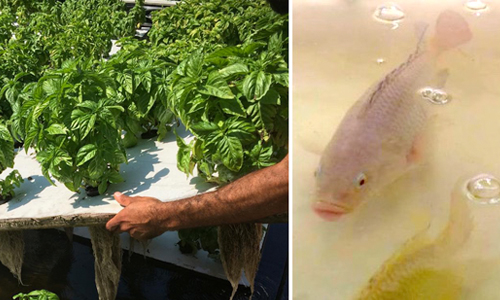

Aquaponics is an emerging urban farming trend that’s ideal for big cities since it’s relatively low-maintenance and can be set up just about anywhere, from rooftops to formerly abandoned lots and buildings.
And Brooklyn is now home to not one, but three aquaponic farms: Verticulture, Edenworks and OKO farms.
[instagram https://instagram.com/p/BEQnYt5MFDB expand=1]
Aquaponics, simply, is a combination of aquaculture and hydroponics. Fish waste becomes a nutritious fertilizer for the plants growing in a soil-free, recirculating water system. In turn, the plants help purify the water for the fish. This agricultural method has plenty of sustainable attributes. Because the water recirculates, it uses 90 percent less water compared to conventional farming methods and eliminates the need for pesticides and other synthetic chemicals.
“The only input into an aquaponics system is food which the fish consume, resulting in a completely organic system,” Oko Farms points out. “As the fish grow and the system ages, the number and variety of crops you can grow also increase so long as you maintain a neutral pH, maintain high oxygen levels, and honor temperature requirements for both fish and plants.”
Oko Farms is located on a formerly vacant lot in Brooklyn’s Bushwick neighborhood and, at 2,500 square feet, is the largest outdoor aquaponics farm in New York City. The farm raises edible fish (tilapia, catfish) and ornamental fish (koi and goldfish) and cultivate vegetables, herbs and flowers, co-founder and farm manager Yemi Amu told the GRACE Communications Foundation. The fish are raised at a ratio of 1 fish per 5 gallons of water and eat a combination of commercial pellets and duckweed cultivated on the farm.
[instagram https://instagram.com/p/BAhRLf-MFOx expand=1]
For dwellers living in the trendy NYC borough, getting fresh local food is as easy as looking up. Edenworks is such a sky-high farm operating off the roof of a East Williamsburg metalworking shop.
The farm utilizes vertical farming methods—in which microgreens, baby greens, and basil are grown in stacked channels.
The plants are nourished from the nutrient-rich manure created by tilapia swimming in nearby tanks.
Hello tilapia. These fish are omnivorous so they can thrive on a vegetarian/vegan diet. Su… https://t.co/OmJCP0UcFE pic.twitter.com/qx8QX6uAlh
— Upward Farms (@eatupwardfarms) May 19, 2016
What’s unique about Edenworks is its “LEGO, or Ikea-like” infrastructure that’s prefabricated and can be flat packed and shipped to site, TechCrunch reported last year.
Edenworks is expanding to a full-scale commercial facility in New York that will yield 130,000 pounds of greens and 50,000 pounds of fish each year.
[instagram https://instagram.com/p/BBkf0FGqBMK expand=1]
At an old Pfizer manufacturing plant in Bedstuy, Verticulture is raising food such as kale, micro basil and Brooklyn-born tilapia and looking to tap into the Big Apple’s $600 million in unmet demand for local produce.
According to The Verge, the startup is producing about 30 to 40 pounds of basil a week thanks to the help of 150-180 tilapia.
The venture is currently in pilot mode and has been experimenting with blue, red, and white LED lights which consume less energy than fluorescent lights and help the plants grow faster, The Verge explained.
Under lights and growing strong! #basil #fresh #local #food #brooklyn #nyc #aquaponics #urbanfarming #green #grow pic.twitter.com/wfEOPE5UTi
— verticulturefarms (@VertiCultureNYC) June 17, 2016
The goal of the project is to make aquaponics a sustainable and profitable way to provide local produce to cities all over the world, as co-founder Miles Crettien told The Verge.
“I believe strongly in the ecological design,” he said. “We can build this anywhere. We can build it in the desert. We can build it in Antarctica.”
Crettien told Edible Brooklyn that the harvest is being sold to retailers such as Foragers, Brooklyn Kitchen, Fresh Direct and Farmigo.
Good morning from this big guy! #male #tilapia #fish #aquaponics #basil #farming #organic #fresh #local pic.twitter.com/h5RUVyjvVI
— verticulturefarms (@VertiCultureNYC) February 2, 2016

 233k
233k  41k
41k  Subscribe
Subscribe 